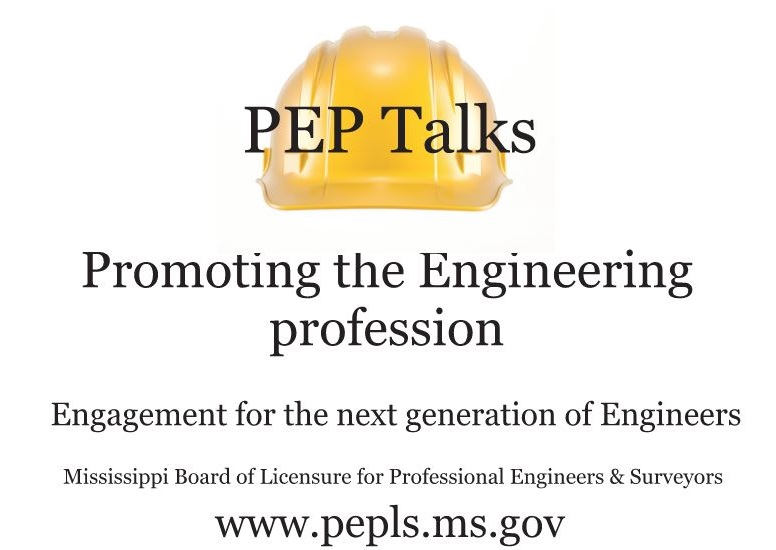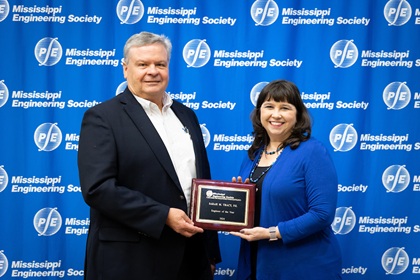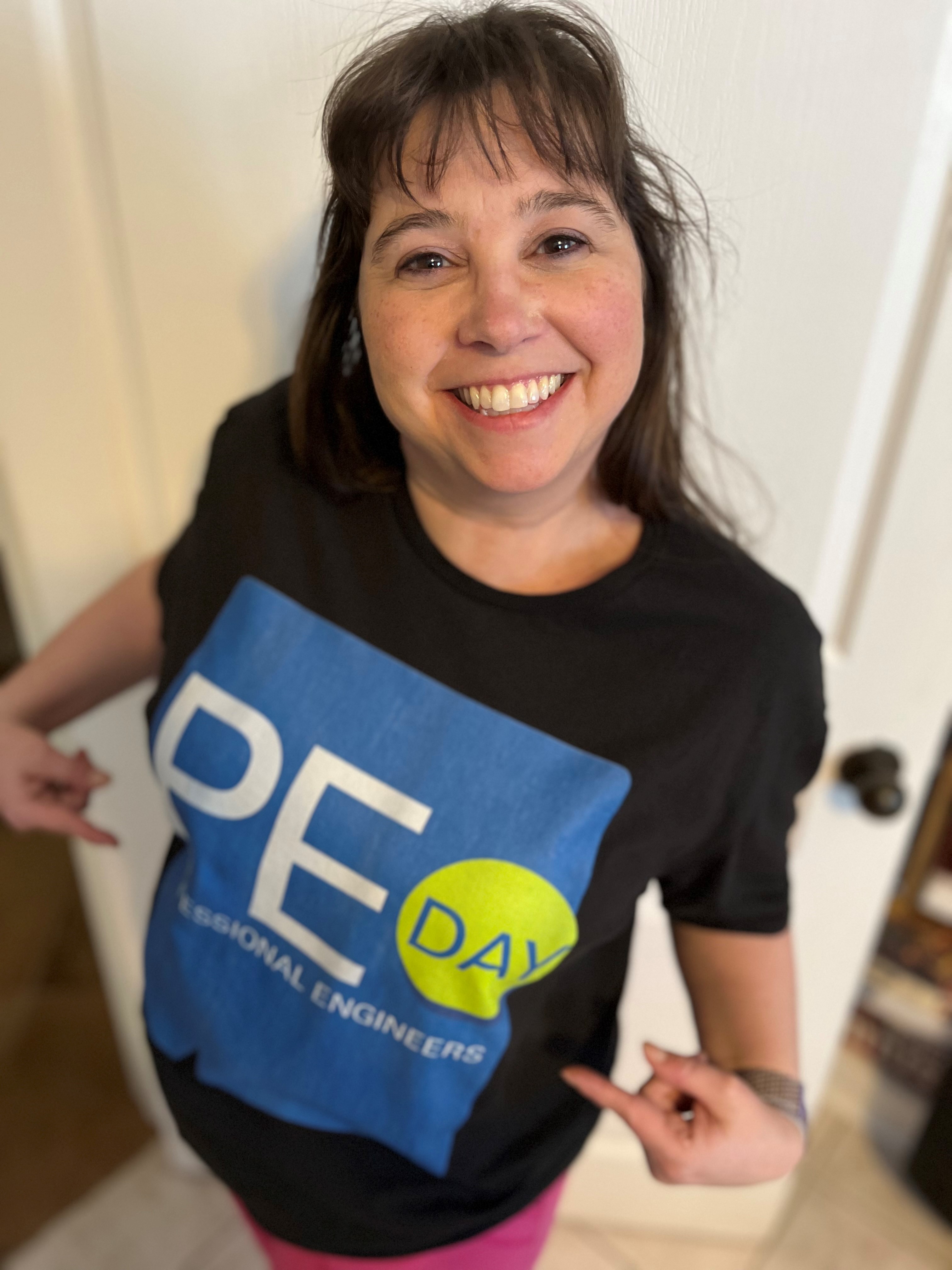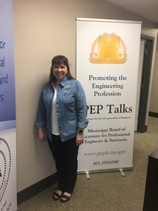Picture it: Jackson, late 2016. I was working for the Mississippi Department of Environmental Quality, trying to wrap up Hurricane Katrina recovery work while also knee deep in the National Fish & Wildlife Foundation’s Gulf Environmental Benefit Fund program (part of the Deepwater Horizon Oil Spill recovery effort). Then. . .an unexpected phone call.
“Hello, Sarah. My name is Mark Humphreys, and I’m the executive director of the Mississippi Board of Licensure for Professional Engineers and Surveyors. Could I stop by your office for a visit?” I said the first thing that came to mind: “Am I being audited?” He laughed and assured me that I was not but added, “It might feel like that, though.”
Mark arrived at my office with the news that Gov. Phil Bryant had appointed me to Post 1 of the Board. (Side note for the uninitiated: the Board is comprised of two engineers and one surveyor from each of the state’s Supreme Court districts; Post 1 is in the Central District with no special emphasis on the number 1.) I knew that I had been on the MES ballot for nominees, but you never really know how those things will turn out when the list gets sent to the governor’s office. Mark also kindly filled me in about the responsibilities and time commitment associated with serving on the Board. The rest, as they say, is history.
 Fast forward to 2025, and I now work for Rural Development, which is a mission area of the US Department of Agriculture. As many are aware, for a period of time earlier this year, we federal employees were tasked with reporting our activities with what was referred to as “The Five Bullets” in response to the question, “What did you do last week?” In that same vein and as my time on the Board is now over, I want to share with you five thoughts in response to the question, “What did you learn in the past eight years?”
Fast forward to 2025, and I now work for Rural Development, which is a mission area of the US Department of Agriculture. As many are aware, for a period of time earlier this year, we federal employees were tasked with reporting our activities with what was referred to as “The Five Bullets” in response to the question, “What did you do last week?” In that same vein and as my time on the Board is now over, I want to share with you five thoughts in response to the question, “What did you learn in the past eight years?”
- Surveying is somewhat of a dying art, and we need more folks to pick up a total station and get out in the field. I heard a presenter one time describe engineering as showing us what might be and surveying as showing us what is. As the Board’s only non-civil engineer (my degree is in biological engineering), I did not have a sufficient appreciation of surveying before serving with some pretty great surveyors and learning more about what goes into becoming a surveyor, including the various educational and experience pathways to licensure. My hat is off to the surveyors in our state, and if you are even a little bit curious about becoming one, reach out to any of the surveyors currently on the Board or the Board’s staff. A person with a drone and an aerial GIS map simply can’t compare to a Professional Surveyor.
- Board membership is not nearly as glamorous as it sounds. There is a lot of work that goes into being an effective board member.
 The Board meets six times a year to discuss, decide, and determine important matters related to the practice of our professions. Outside of meetings, board members also review applications; ensure that rules and regulations are up to date; attend meetings of the National Council of Examiners for Engineers and Surveyors (NCEES); and provide outreach, such as presenting in professional, technical, and educational settings. One of the most important aspects is the handling of disciplinary cases, which must be diligently investigated and seriously considered. The main purpose for licensure is protecting the health, safety, and welfare of the public, which is why getting a license is not an easy endeavor. Keeping that license entails the ethical practice of engineering or surveying, as well as staying current on emerging technologies and advancements through continuing professional development. Complaints to the Board are not taken lightly. Whether a licensee’s actions are being questioned or a non-licensee may be performing services reserved for licensed individuals, each case is examined and deliberated before a final decision is rendered.
The Board meets six times a year to discuss, decide, and determine important matters related to the practice of our professions. Outside of meetings, board members also review applications; ensure that rules and regulations are up to date; attend meetings of the National Council of Examiners for Engineers and Surveyors (NCEES); and provide outreach, such as presenting in professional, technical, and educational settings. One of the most important aspects is the handling of disciplinary cases, which must be diligently investigated and seriously considered. The main purpose for licensure is protecting the health, safety, and welfare of the public, which is why getting a license is not an easy endeavor. Keeping that license entails the ethical practice of engineering or surveying, as well as staying current on emerging technologies and advancements through continuing professional development. Complaints to the Board are not taken lightly. Whether a licensee’s actions are being questioned or a non-licensee may be performing services reserved for licensed individuals, each case is examined and deliberated before a final decision is rendered. - Time management is your friend. As you have likely already surmised, the Board is made of active licensees (with an occasional retiree thrown in from time to time) who have at least part-time but usually full-time professional responsibilities, as well as families. I learned quickly that I would have to prioritize my time even more than I had before joining the Board to ensure that all areas of my life received the attention that they deserved. My goal during my year as president was to have focused and efficient meetings that yielded effective results and respected everyone’s time, especially our folks who had to travel from the coast or northeast Mississippi. Setting aside focused time without distractions to review complaints or participate on NCEES committees maximized those efforts as well.
- Interpersonal skills are just as important as technical ones. Ok, so, I actually knew this one before becoming a Board member. Still, it bears discussion. Engineers, as a group, are not exactly known for being especially social or extroverted but are known for being highly technical and often very literal and precise. Now, imagine nine of those people discussing the finer points of professional practice, rules of conduct, and the like. Take it a step further and imagine hundreds of those folks at national and regional meetings talking about all manner of subjects – from the appropriate types of degrees that should be eligible for licensure to the best test questions to determine competency to how funds should be spent. Learning to read non-verbal cues, soften tone, and listen to other viewpoints with respect has served me well in general and definitely during my time on the Board.

- Giving back to your profession is very personally rewarding. Being able to promote my profession while also serving my peers and the public has been one of the highlights of my career. I have been in public service since graduating from college. So, serving on the Board felt somewhat like a natural extension of what I was already doing. Really, though, it was more. It was an opportunity to return the favor, so to speak, to a profession that has given me so much in terms of job satisfaction, personal growth, and helping others.
Well, there you have it – a peek behind the curtain. Now, if you find yourself on the receiving end of a phone call like I got in 2016, I encourage you to say, “Yes.”
Thanks for coming to my PEP Talk.
 About the author: Sarah M. Tracy, PE has been licensed in
About the author: Sarah M. Tracy, PE has been licensed in
the State of Mississippi for more than 27 years. She served
on the Mississippi Board of Licensure from 2016 to June
2025 and was the first woman to be appointed to the Board.
She was a long-time employee of the Mississippi
Department of Environmental Quality and currently works
with the United States Department of Agriculture. In
August 2025 she was granted Emeritus status a member of
NCEES.
Articles by contributors are not necessarily the viewpoint or opinion of the Mississippi Board of Licensure for Professional Engineers & Surveyors.
